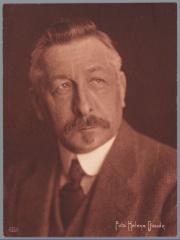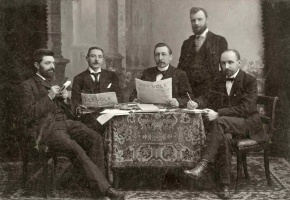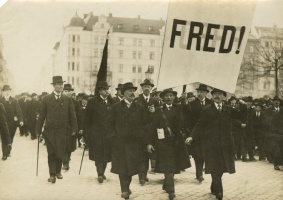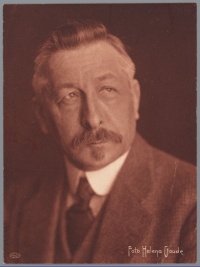Education and Early Career↑
Pieter Jelles Troelstra (1860-1930) studied law in Groningen, where Pieter Wilhelm Adriaan Cort van der Linden (1846-1935) was one of his tutors, and practiced as a lawyer until he became one of the twelve founding members of the Dutch socialist party, officially known as the Sociaal Democratische Arbeiders Partij (SDAP) or Social-Democratic Labour Party, in August 1894. He became the first party leader and its first member of Parliament (MP) in September 1897. Throughout his political career he continued to work as a journalist, for many years editing the socialist daily newspaper Het Volk (The People).
Troelstra followed the German socialist leader August Bebel (1840-1913) in proclaiming that he intended to introduce social(ist) reforms democratically, though he never explicitly rejected the possibility of a revolution. The SDAP was modelled on its German sister party and made universal suffrage the cornerstone of its political programme.
In parliament Troelstra became known as a gifted speaker and a great debater, yet he himself remained doubtful about the efficacy of the parliamentary system. He regarded it as a bourgeois vehicle that at some point might have to be replaced by different parliamentary and economic models. He was a charismatic leader and extremely popular with the common voters, but had a tendency to operate individually and repeatedly clashed with his own party leadership.
Troelstra’s Political Path During World War I↑
In the first weeks of the war, when it was still unclear whether Holland would be able to remain neutral, the socialist MPs loyally supported the liberal government. However, by the end of the year, when Dutch neutrality seemed assured, Troelstra and the government clashed over whether to introduce a war loan (as the government intended) or a war tax on the rich (as Troelstra advocated). From then on the government could no longer count on socialist support.
During the war, Troelstra was actively involved in the international socialist movement’s peace efforts, but his close links with the German socialist party meant that in both Holland and the Allied countries he was suspected, with good reason, of pro-German sentiments.
Misread Signs: A Failed Revolution↑
Troelstra was no admirer of Vladimir Lenin (1870-1924), and for that reason he did not welcome the Russian revolution of 1917. But he did see it as a clear sign of widespread popular dissatisfaction that was rapidly moving westwards. When revolution broke out in Germany and Wilhelm II, German Emperor (1859-1941) abdicated, it was clear to Troelstra that the old world order had come to an end. Without consulting his party leadership he made a speech in parliament on 12 November 1918 in which he declared that the revolution had reached Holland and that the government should avoid bloodshed by immediately handing over power to the Socialist Party.
Troelstra’s belief was based on events in Russia, Switzerland and (especially) Germany, and on his long-held conviction that a power change was a historical necessity. However, he had completely misread the true state of affairs in Holland. Though the people complained bitterly about food and fuel distribution and the government’s refusal to demobilize troops, there was no desire for a revolution, not even within the Socialist Party itself. By the end of the week, Troelstra had suffered a nervous breakdown and his deputy was left with the task of limiting the damage to both the party and its leader.
Later Life↑
Troelstra was forgiven and returned to parliament, staying on as party leader until his retirement in 1925. He spent the final years of his life working on his four-volume memoirs, the last part of which he did not live to complete. His attempted coup lives on in Dutch parliamentary history as De vergissing van Troelstra (Troelstra’s mistake).
Paul Moeyes, Hogeschool van Amsterdam (Amsterdam University of Applied Sciences)
Section Editor: Emmanuel Debruyne
Selected Bibliography
- Hagen, Piet: Politicus uit hartstocht. Biografie van Pieter Jelles Troelstra (Politician out of passion), Amsterdam 2010: De Arbeiderspers.
- Scheffer, H. J.: November 1918. Journaal van een revolutie die niet doorging (November 1918. Journal of a revolution that did not take place), Amsterdam 1985.
- Troelstra, Pieter Jelles: Gedenkschriften. Vierde Deel (Memoirs. Storm), volume 4, Amsterdam 1931: Querido.











